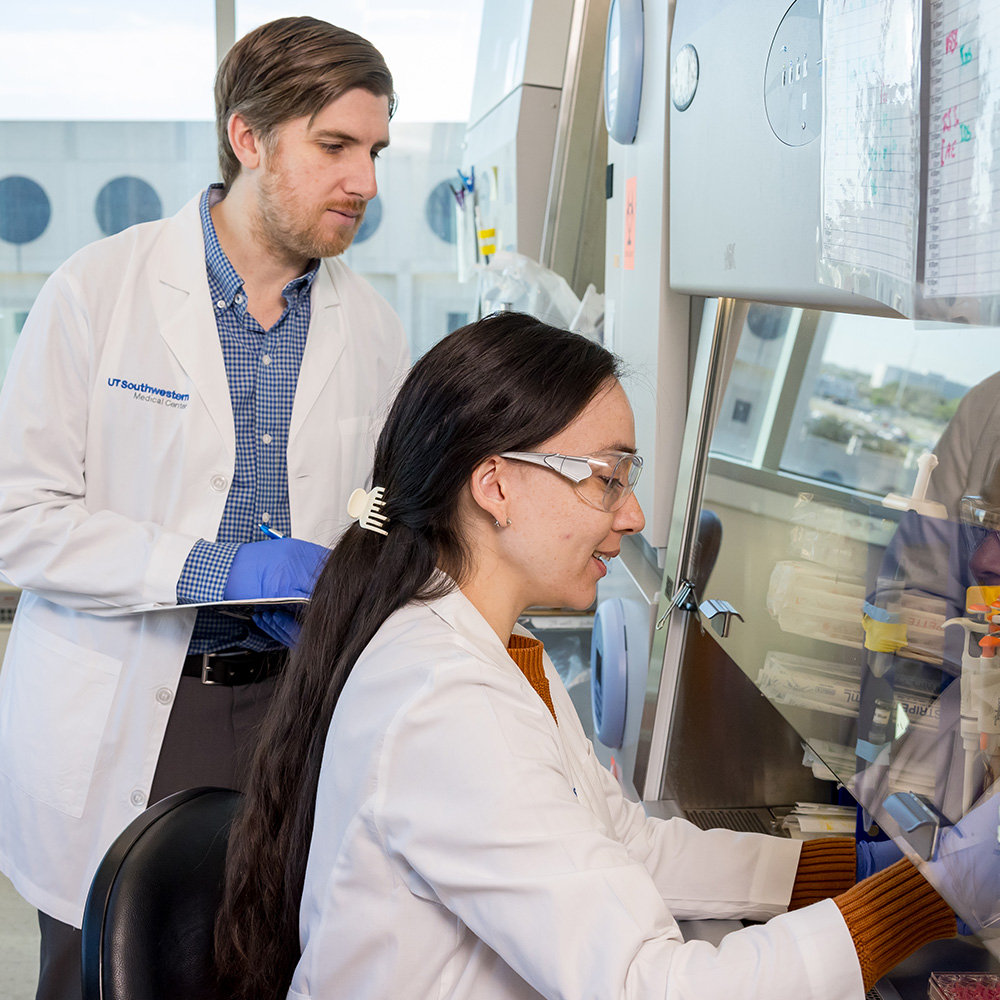UT Southwestern launches ‘Call Out Cancer’ initiative

Health initiative encourages prevention, early detection as part of National Cancer Institute comprehensive designation for Harold C. Simmons Comprehensive Cancer Center
DALLAS – October 5, 2015 – UT Southwestern Medical Center today announced the launch of “Call Out Cancer,” a new health initiative designed to promote awareness, early detection, and prevention of all types of cancer.
The year-long initiative by UT Southwestern’s Harold C. Simmons Comprehensive Cancer Center – which was recently designated by the National Cancer Institute as a Comprehensive Cancer Center, the NCI’s highest distinction – will feature important developments in cancer care across a range of platforms, including social media and a dedicated website. The goal is to spur awareness and content sharing so that more people in North Texas have access to the latest cancer-related information.
#Calloutcancer will be the hashtag for social media. Online, the utswmedicine.org/calloutcancer website allows survivors, family members, and friends, as well as the medical community, to Call Out Cancer by sharing their personal stories and struggles with the disease. In addition, visitors to the site will find practical information about the latest and best opportunities for prevention and early detection of cancer to share across social media channels.
“Research at UT Southwestern and elsewhere makes it clear that knowing about cancer risk leads to early detection and prevention of cancer,” said Dr. Daniel K. Podolsky, President of UT Southwestern.
“UT Southwestern researchers and caregivers dedicate themselves daily to better understanding the many forms of cancer and applying this knowledge to develop better approaches to treatment and prevention. We are equally committed to ensuring that this knowledge extends beyond the scientific and medical communities. To fulfill that commitment, we need to engage the broader public in cancer education and awareness. Call Out Cancer is intended to achieve that objective,” added Dr. Podolsky, who holds the Philip O’Bryan Montgomery, Jr., M.D. Distinguished Presidential Chair in Academic Administration, and the Doris and Bryan Wildenthal Distinguished Chair in Medical Science.
Call Out Cancer furthers the community outreach and education missions of the Simmons Cancer Center, the only NCI-designated Comprehensive Cancer Center in North Texas and one of only 45 in the nation. The Call Out Cancer initiative also aligns with UT Southwestern’s three-fold mission as an academic medical center – excellent clinical care, groundbreaking research, and quality medical education.
Among the first to join the initiative was Dallas Mayor Mike Rawlings, who said, “Cancer is a disease that touches almost every family in this area and throughout the country. We are fortunate to have one of the best academic medical centers in the country in UT Southwestern focused on treatment and cures that are truly game changing. It is just the right thing to do in getting behind this initiative and I hope many others in Dallas will join me in Calling Out Cancer.”
Local ABC affiliate WFAA-TV has pledged to dedicate some of its resources to increasing awareness about steps people can take to decrease their cancer risk, or cope with a cancer diagnosis.
The Call Out Cancer launch will be covered live on WFAA’s “Good Morning Texas” program at 9 a.m. Central time on Monday, Oct. 5. The station also will feature a weekly cancer-related segment on its 4 p.m. newscasts every Monday. By joining together, UT Southwestern and WFAA will highlight each month a specific aspect of cancer prevention and detection, starting with a special focus in conjunction with Breast Cancer Awareness Month in October.
“The real key to cancer prevention is self-empowerment – taking ownership of one’s own health,” said Dr. James K.V. Willson, Associate Dean of Oncology Programs, and Professor and Director of the Simmons Cancer Center.
“An important step is embracing lifestyle changes, such as using sunscreen, quitting smoking, being physically active, or improving dietary habits. Another essential step is utilizing appropriate cancer screenings to help prevent cancer. For example, removing polyps before they turn into colon cancer can prevent this devastating disease. Empowerment begins with information and awareness, and that’s what the Call Out Cancer initiative emphasizes. We want to provide greater access to the knowledge each person needs to tailor their individual habits and care to their risk factors – whether those factors are genetic, familial, or environmental. We assess the risks and causes when treating cancer, and a similar strategy can be effective in preventing cancer,” said Dr. Willson, who holds the Lisa K. Simmons Distinguished Chair in Comprehensive Oncology.
In 2015, an estimated 1.7 million new cases of cancer will be diagnosed in the United States and nearly 600,000 people will die from cancer. But the risk of certain cancers can be reduced.
“It’s important to remember that cancer is not a single disease, but a grouping of more than 150 different diseases with different causes, which holds distinct opportunities for prevention or early detection,” said Dr. Willson, a colon cancer specialist.
Preventive strategies include not only lifestyle changes, but also avoiding chemicals and other substances (such as asbestos) that have been associated with cancer. Prevention also involves identifying precancerous conditions that can eventually turn into cancer, and utilizing chemoprevention medicines that can treat precancerous conditions or prevent recurrence of cancers.
For example, selective estrogen receptor modulators (SERMS) such as tamoxifen or raloxifene have been shown to reduce the risk of breast cancer in women at high risk, according to the NCI. Researchers, including those at UT Southwestern, are studying COX-2 inhibitors for prevention of colorectal and breast cancer. Some cancers caused by viral and bacterial infections can be prevented with vaccines, including vaccinations against hepatitis B and certain strains of human papillomavirus (HPV), according to the NCI.
To join the Call Out Cancer initiative, begin by visiting utswmedicine.org/calloutcancer and clicking on the I #CallOutCancer button. From there, you’ll have access to and be able to share practical, science-based information about risk factors, cancer prevention opportunities, cancer screenings, and view videos illustrating how others are Calling Out Cancer. Include #CallOutCancer whenever you have information to share through social media (YouTube, Twitter, Facebook, Google+, LinkedIn, and other outlets) to help us spread the message of prevention and early detection.
About Harold C. Simmons Comprehensive Cancer Center
UT Southwestern’s Harold C. Simmons Comprehensive Cancer Center, the only NCI-designated Comprehensive Cancer Center in North Texas, includes 12 major cancer care programs with a focus on treating the whole patient with innovative treatments, while fostering groundbreaking basic research that has the potential to improve patient care and prevention of cancer worldwide. In addition, the Center’s education and training programs support and develop the next generation of cancer researchers and clinicians. The Simmons Cancer Center is among only 30 U.S. cancer research centers to be named a National Clinical Trials Network Lead Academic Participating Site, a prestigious designation by the NCI, and the only cancer center in North Texas to be so designated. The designation and associated funding is designed to bolster the cancer center’s clinical cancer research for adults and to provide patients access to cancer research trials sponsored by the NCI, where promising new drugs often are tested.
About UT Southwestern Medical Center
UT Southwestern, one of the premier academic medical centers in the nation, integrates pioneering biomedical research with exceptional clinical care and education. The institution’s faculty includes many distinguished members, including six who have been awarded Nobel Prizes since 1985. The faculty of more than 2,700 is responsible for groundbreaking medical advances and is committed to translating science-driven research quickly to new clinical treatments. UT Southwestern physicians provide medical care in 40 specialties to about 92,000 hospitalized patients and oversee approximately 2.1 million outpatient visits a year.
###
Media Contact: Lori Sundeen Soderbergh
214-648-2876
lori.soderbergh@utsouthwestern.edu
To automatically receive news releases from UT Southwestern via email, subscribe at www.utsouthwestern.edu/receivenews




